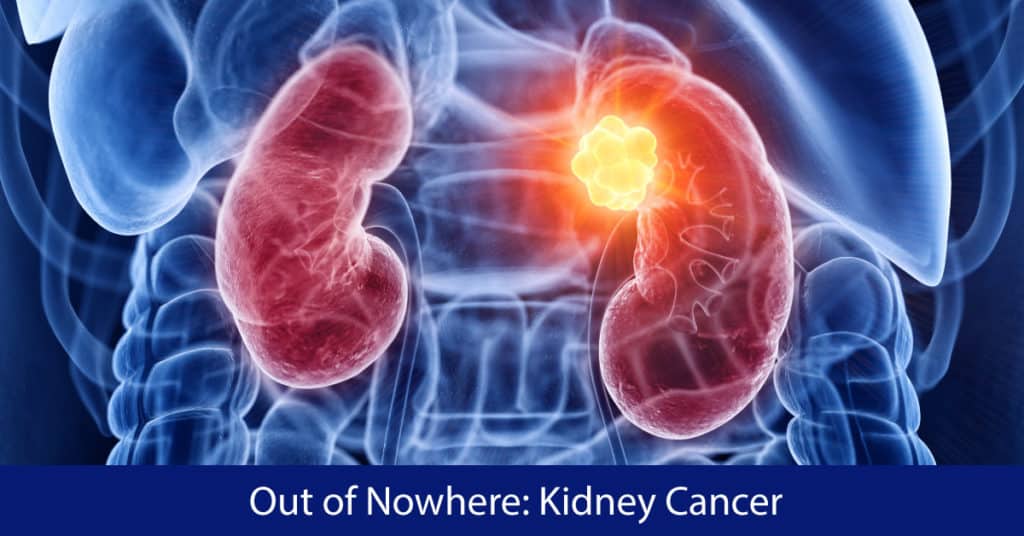Out of Nowhere: Kidney Cancer

Of the estimated 1.9 million cancers diagnosed each year in the US, around 4 percent are kidney cancers, the most common are renal cell carcinomas (RCC). Around 76,000 new cases will occur in the US in 2021, 48,0000 in men and 27,000 in women. Kidney cancer can occur at any age, but is most likely to be diagnosed between the ages of 55 – 75.1,2,3
Out of the Blue
Patients and caregivers describe sudden and unexpected diagnoses of kidney cancer:
My husband was just newly diagnosed with kidney cancer metastasized to bone. He is only [age]…. My world has collapsed on me.
About [date] I got Covid-19. While they were doing a CT scan of my lungs they saw a mass on my right kidney. I had to go back for another scan with injection to show more clearly. They told me it was cancer but it looked like it was localised to the kidney.
This is because, in its early stages, kidney cancer causes few symptoms. Early stage kidney cancers are highly treatable and may be found incidentally on x-rays or CT scans. The 5-year survival rate for localized kidney cancers is 93%. If there have been no metastases, surgery to remove all or part of the kidney is the first step in treatment.
However, people usually only experience symptoms as the tumor grows in size and pushes on other organs, resulting in symptoms such as blood in the urine. For stage 4 kidney cancers with distant metastasis, the 5-year survival rate is only 13%. One study also found that five years was not long enough for RCC surveillance because the rate of recurrence 60 months after surgery was still 20%.4,5,6,7
New Findings in Clinical Trials
Part of the historical difficulty in treating the most common form of renal cell carcinoma, clear cell RCC, is that it is resistant to chemotherapy and radiation, leading to longstanding efforts to find novel and effective treatments for metastatic RCC (mRCC).8 One breakthrough class of drugs, tyrosine kinase inhibitors (TKIs), continues to produce results in clinical trials.
The SWOG 1500 study, presented at this year’s ASCO virtual symposium, found that a drug called cabozantinib surpassed the performance of three other TKIs, one by 23%. It also reduced the risk of disease progression or death in mRCC by 40% when compared to the other best-performing TKI studied, sunitinib. In March, the FCC approved another TKI inhibitor, called tivozanib, for treating relapsed or refractory advanced renal cell carcinoma in patients who have received two or more prior systemic therapies.9,10
For more than a year now I have been getting an [drug name] IV every three weeks and also take a daily cabozantinib pill (20mg). Pet-scans after 6 months have now shown twice a reduction of my tumor in my adrenal gland by 10%. Anybody else having success with this combination?
Promising Combination Therapies
Other recent clinical trial results, also presented at the ASCO symposium, found promising results in drug combinations involving immunotherapies paired with a TKI called VEGF (vascular endothelial growth factor) or other inhibitor. The phase 3 CLEAR trial compared two combinations against a TKI inhibitor, sunitinib, as a monotherapy. The combination of a VEGF inhibitor, lenvatinib, with an immune checkpoint inhibitor, pembrolizumab, was found to be superior to sunitinib alone in progression free and overall survival in patients with mRCC, as was the combination of lenvatinib and an mTOR kinase inhibitor, everolimus.11,12
I have stage 4 RCC and will be starting a new treatment since immunotherapy didn’t work. Has anyone used this combo [everolimus] and lenvatinib? if so what was the common side effects? I realize everyone is different. Just trying to figure out what to expect.
The KEYNOTE 426 study, published in 2019, found that the combination of pembrolizumab with the VEGF inhibitor, axitinib showed survival benefits and an improved subjective response rate when compared with sunitinib as a first treatment after surgery. The 42 month follow-up of the study, presented at ASCO, affirmed these results and found no new adverse effects. In fact, 10% of patients even had a complete response with pembrolizumab + axitinib, compared to 3.5% with sunitinib. (Over half of both groups were also receiving other treatments.)12,13
Kidney Cancer and Inspire
There are over 15,000 members of Inspire who are interested in kidney cancer and over 11,000 posts have been written by patients and caregivers about their experiences with this cancer. Members welcome new participants and discuss every aspect of their experience, including informing each other about academic research centers and specialists, researching clinical trials, managing side effects, and, importantly, supporting each other through the cancer experience. When a new member said,
Hi- I joined the group today after a friend told me I need to find support from others dealing with the same thing….I have so many thoughts running through my head right now. Fear is one, but I’m trying to stay positive. Glad I found this group!
…another replied:
My thoughts and prayers are with you. Stay positive and vigilant. The fear and anxiety are very normal. Just quickly get into the “I”m going to beat this thing” and stay in that frame of mind. Don’t spend too much time looking at stats and never feel stupid making certain you understand what the doctor is saying and doing.
Patients of many diseases, common or rare, come to Inspire to get the kind of advice and support that can only come from people who are “in the trenches” too.
Inspire offers a trusted community to patients and caregivers. Our goal with this blog, this website and our content is to provide the life science industry access to the true, authentic patient voice. In so doing, we support faithful operationalization of patient-centricity. Take a look at our case studies, eBooks and news outlet coverage.
References
1https://www.cancer.org/research/cancer-facts-statistics/all-cancer-facts-figures/cancer-facts-figures-2021.html
2https://www.cancer.org/cancer/kidney-cancer/about/key-statistics.html
3https://seer.cancer.gov/statfacts/html/kidrp.html
4https://www.mayoclinic.org/diseases-conditions/kidney-cancer/symptoms-causes/syc-20352664
5 https://www.cancer.org/cancer/kidney-cancer/detection-diagnosis-staging/survival-rates.html
6https://www.cancer.org/content/dam/CRC/PDF/Public/8661.00.pdf
7https://www.practiceupdate.com/content/long-term-risk-of-recurrence-in-surgically-treated-renal-cell-carcinoma/95452
8https://mct.aacrjournals.org/content/17/7/1355.short
9https://www.curetoday.com/view/cabometyx-significantly-prolongs-survival-over-sutent-in-rare-form-of-kidney-cancer
10https://www.fda.gov/drugs/resources-information-approved-drugs/fda-approves-tivozanib-relapsed-or-refractory-advanced-renal-cell-carcinoma
11 https://ikcc.org/summary-of-kidney-cancer-take-home-messages-from-asco-2021/
12https://www.curetoday.com/view/immunotherapy-combinations-offer-hope-and-promise-for-patients-with-advanced-renal-cell-carcinoma
13https://www.nejm.org/doi/full/10.1056/NEJMoa1816714





